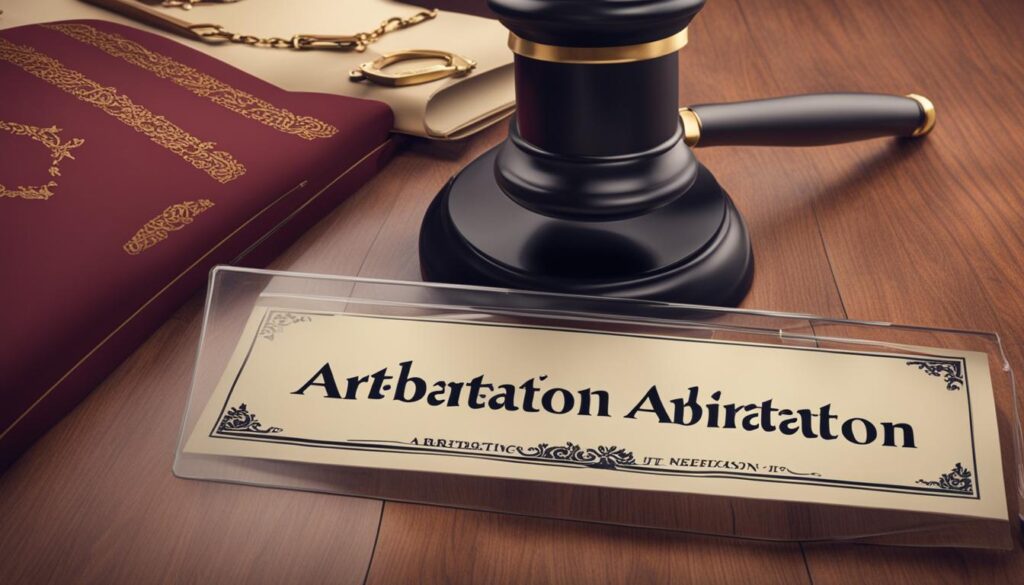We may earn money or products from the companies mentioned in this post.
When parties are unable to resolve a conflict through negotiation or other means, they may resort to legal action. However, litigation can be time-consuming, expensive, and adversarial. Alternative dispute resolution methods, such as arbitration and mediation, offer parties a more flexible and collaborative approach to resolving disputes.
In this section, we will provide an overview of arbitration and dispute resolution methods. We will explore alternative dispute resolution options and highlight the benefits of using these methods instead of going to court.
Key Takeaways
- Arbitration and dispute resolution methods are alternatives to litigation.
- Alternative dispute resolution methods offer a more flexible and collaborative approach to conflict resolution.
- Using alternative dispute resolution methods can save time and money compared to going to court.
- Parties involved in a dispute can choose the method of dispute resolution that best suits their needs.
- Arbitration and mediation are two common alternative dispute resolution methods.
Exploring Mediation as an Effective Dispute Resolution Strategy
When it comes to resolving conflicts, mediation has gained significant popularity as a collaborative approach that achieves satisfactory outcomes. Unlike litigation, which can be costly, time-consuming, and adversarial, mediation is a voluntary and confidential process that can be initiated at any point during a dispute.
The Mediation Process
The mediation process involves a neutral third-party mediator who facilitates communication between the parties in conflict. The mediator helps the parties identify and address the underlying issues and interests that have led to the dispute.
The mediation process is divided into several phases:
- Introduction: The mediator introduces themselves and sets the tone for the mediation process. They explain the purpose of mediation and confirm that the parties agree to participate voluntarily.
- Opening statements: Each party is given an opportunity to state their perspective on the dispute.
- Identification of issues: The mediator helps the parties identify the issues that need to be addressed and understand each other’s needs and interests.
- Exploration of possible solutions: The parties explore possible solutions and alternatives that address the interests and needs of both parties.
- Agreement: If the parties reach an agreement, the mediator creates a written agreement that outlines the terms of the settlement.
Advantages of Mediation
Mediation provides many advantages that make it an effective dispute resolution strategy:
- Cost-effective: Mediation is usually less expensive than litigation and allows parties to save money on legal fees.
- Time-efficient: Mediation usually takes less time than going to court, and the parties have more control over the timeline.
- Flexible: Mediation can be tailored to the specific needs of the parties and can be scheduled at a mutually convenient time and place.
- Confidential: The mediation process is strictly confidential, ensuring that sensitive information remains private.
- Preserves relationships: Unlike litigation, which often damages relationships, mediation promotes communication and collaboration, preserving important relationships.
Mediation is a powerful strategy for resolving conflicts, and more individuals and organizations are turning to it as a first-choice option. But mediation is not always appropriate, and in some cases, arbitration or litigation may be necessary. In the next section, we will explore the arbitration process and its benefits.
Understanding the Arbitration Process and its Benefits
Arbitration is a dispute resolution process that involves the use of an arbitrator or panel to render a binding decision on a dispute. This process has several benefits over traditional court litigation, particularly in commercial settings.
“Arbitration is faster, more flexible, and less costly than traditional litigation. It also provides a lower-stress, confidential, and collaborative environment that is conducive to resolving disputes more effectively,”
The arbitration process typically begins with an agreement between the parties involved to submit their dispute to arbitration. The agreement will often specify the rules and procedures that will be used to guide the arbitration process. Depending on the complexity of the dispute, a single arbitrator or a panel of arbitrators may be appointed to hear the case.
During the arbitration hearing, each party will present their case and supporting evidence to the arbitrator or panel. The arbitrator or panel will then render a decision, which is legally binding on both parties.
The Benefits of Commercial Arbitration
Commercial arbitration has several benefits over traditional court litigation. One major advantage is the ability to choose an arbitrator with specialized knowledge or expertise in the relevant industry or subject matter. This can lead to more informed and accurate decisions.
Another advantage of commercial arbitration is its flexibility. Parties have the freedom to tailor the process to their specific needs and preferences, including the location, language, and procedures used in the arbitration. This can help to streamline the process and reduce costs.
Moreover, the confidentiality of the arbitration process can be a significant advantage for businesses. Unlike court litigation, arbitration proceedings are usually conducted in private, which can help to protect sensitive information and trade secrets.
How Arbitration Differs from Mediation
While both arbitration and mediation are alternative dispute resolution methods, they differ in several key ways. Mediation is a collaborative process that involves a neutral third party helping the parties to reach a mutually acceptable agreement.
Arbitration, on the other hand, is an adversarial process that involves a decision-maker rendering a binding decision on the dispute. While mediation is non-binding, the decision made by an arbitrator in commercial arbitration is legally binding on both parties.
Arbitration can be a highly effective way to resolve disputes, particularly in commercial settings. Its many advantages, including speed, flexibility, and confidentiality, make it an attractive alternative to traditional court litigation.
International Arbitration: Resolving Cross-Border Disputes
When parties from different countries are involved in a dispute, the process can become more complex and challenging. This is where international arbitration comes into play as an effective alternative to traditional litigation in court. International arbitration is a private and impartial process where parties agree to submit their dispute to an arbitral tribunal, which will make a binding decision.
Arbitration is particularly useful in cross-border disputes as it offers various advantages, such as:
- Confidentiality: Unlike court proceedings, arbitration is private and confidential. This makes it ideal for disputes that involve sensitive or confidential information.
- Flexibility: Parties can agree on a convenient time and place for the arbitration process, which can help to expedite the resolution of disputes.
- Expertise: Parties can select arbitrators who have specialized knowledge and experience in the relevant field, ensuring that the dispute is resolved by experts in the subject matter.
- Enforceability: Arbitration awards can be enforced in most countries worldwide, ensuring that the parties can obtain a binding and enforceable decision that is recognized internationally.
The role of the arbitral tribunal in international arbitration is critical. The tribunal is typically composed of one or three arbitrators who are selected by the parties or appointed by a neutral organization. The arbitrators are responsible for conducting the arbitration proceedings, hearing evidence, and reaching a final decision. The arbitral tribunal’s decision is final and binding, and parties must comply with the award.
In conclusion, international arbitration is an effective method of resolving cross-border disputes that offers several advantages over traditional litigation. By utilizing an arbitral tribunal, parties can achieve a binding and enforceable decision, while also benefiting from confidentiality, flexibility, and expertise.
The Importance of Arbitration Agreements in Dispute Settlement
An arbitration agreement is a contract between two or more parties that specifies how they will resolve disputes outside of court, through an arbitration process. Arbitration agreements can be included in contracts, business agreements, or other legal arrangements.
The purpose of an arbitration agreement is to ensure a smoother dispute settlement process by providing a clear and agreed-upon framework for resolving conflicts. By agreeing to arbitration, parties can often avoid the time, expense, and uncertainty associated with traditional court proceedings.
An arbitration agreement can also provide certain benefits, such as greater privacy and confidentiality in the dispute resolution process. Because arbitration is a private process, parties can avoid the public disclosure of sensitive business or personal information that might occur during court proceedings.
Benefits of Arbitration Agreements
Here are some of the key benefits of including an arbitration agreement in a legal contract or agreement:
- Time and Cost Savings: Arbitration is typically a faster and less costly process than traditional court proceedings. Because parties can choose their own arbitrator and set their own schedule, the process can often be completed more efficiently than a court case.
- Reduced Risk of Bias: In some cases, parties may be concerned about the impartiality of a court judge or jury. With arbitration, parties can often choose an arbitrator who is knowledgeable in the relevant area of law and who they believe will be fair and impartial.
- Flexibility: Arbitration agreements can be tailored to meet the specific needs and requirements of the parties involved. For example, parties can agree on the rules and procedures to be followed, the location of the arbitration, and other important details.
Enforcing an Arbitration Agreement
Once an arbitration agreement is in place, parties are generally bound by its terms and must attempt to resolve any disputes through arbitration. If one party fails to comply with the agreement, the other party may seek a court order compelling them to participate in arbitration.
However, there are some situations in which an arbitration agreement may not be enforceable. For example, if the agreement was signed under duress, or if it violates public policy, a court may refuse to enforce it.
Examining the Effectiveness of Arbitration and Dispute Resolution in Practice
Real-life examples and case studies showcase the effectiveness of arbitration and dispute resolution methods. Parties involved in disputes can benefit from these strategies and achieve fair and amicable resolutions. Here are examples of successful arbitration and dispute resolution:
| Dispute | Method | Outcome |
|---|---|---|
| Contractual Dispute | Arbitration | The arbitrator ruled in favor of the defendant, concluding that the plaintiff failed to meet its obligations under the contract |
| International Trade Dispute | Mediation | The parties reached a settlement agreement that was mutually beneficial and saved both parties time and money compared to litigation |
| Intellectual Property Dispute | Arbitration | The arbitrator issued a decision that was well-reasoned and provided clarity on the legal issues involved in the case, satisfying both parties |
These examples illustrate how arbitration and dispute resolution methods can be effective in resolving conflicts. Not only do these methods provide a faster and more cost-effective alternative to traditional litigation, but they also promote cooperation and collaboration between parties, leading to better long-term relationships.
Conflict Resolution Benefits
Arbitration and dispute resolution methods can offer various benefits for parties involved in conflicts. Here are some of the conflict resolution benefits:
- Less time-consuming
- Cost-effective
- Flexible and customizable
- Confidential
- Collaborative
- Less adversarial
By utilizing these methods, parties can achieve a resolution that is tailored to their specific situation and needs, without the need for a lengthy and costly trial.
“Mediation is a collaborative approach to conflict resolution that encourages parties to work together towards a mutually beneficial agreement.”
Ultimately, the effectiveness of arbitration and dispute resolution methods depends on the parties’ willingness to work together, but when successful, these methods can lead to positive and long-lasting outcomes.
Conclusion
Arbitration and dispute resolution methods can provide effective and peaceful solutions to conflicts in various settings, including commercial and international disputes. Rather than resorting to lengthy and costly court proceedings, parties can agree to settle their disputes through mediation or arbitration, which can yield expedient and amicable outcomes.
It is important to note the significance of agreements in arbitration, as clear and comprehensive contracts can help facilitate the process and reduce the likelihood of further disputes. Furthermore, it is crucial for parties to select experienced arbitrators and mediators who can objectively evaluate the issues at hand and offer fair decisions.
Through analyzing real-life examples and case studies, we can see how effective arbitration and dispute resolution can be in practice. By choosing these methods, parties can avoid the unpredictable and time-consuming legal system, and instead work towards mutually beneficial solutions.
In conclusion, it is clear that arbitration and dispute resolution should be considered as viable options for resolving conflicts. By doing so, parties can save time, money, and maintain positive business and personal relationships. Thus, it’s vital to keep in mind the benefits of alternative dispute resolution methods to achieve ultimately peaceful and fair conflict resolution.
FAQ
What is arbitration and dispute resolution?
Arbitration and dispute resolution are methods used to resolve conflicts outside of the traditional court system. These methods provide parties with alternative options for resolving their disputes in a more collaborative and efficient manner.
What are the benefits of using alternative dispute resolution methods?
Alternative dispute resolution methods, such as mediation and arbitration, offer several advantages. These include faster resolution times, cost savings compared to litigation, confidentiality, and the opportunity for parties to have more control over the outcome.
How does mediation differ from other dispute resolution methods?
Mediation is a voluntary process where a neutral third party, known as a mediator, assists parties in reaching a mutually acceptable agreement. Unlike arbitration, the mediator does not make a binding decision but facilitates communication and negotiation between the parties.
What is the arbitration process?
The arbitration process involves the use of an arbitrator or a panel of arbitrators who act as neutral decision-makers. The parties present their cases, and the arbitrator(s) render a binding decision, known as an arbitration award, based on the evidence and arguments presented.
Why is arbitration commonly used in commercial settings?
Arbitration is often preferred in commercial settings due to its advantages, such as confidentiality, flexibility, and the ability to choose an arbitrator with expertise in the relevant industry. Additionally, arbitration awards are generally enforceable internationally, making it an effective mechanism for resolving cross-border disputes.
What is international arbitration?
International arbitration is the process of resolving disputes that involve parties from different countries. It often takes place before an arbitral tribunal, which consists of arbitrators with expertise in international law and cross-border disputes.
What is an arbitration agreement?
An arbitration agreement is a contract between parties that establishes their agreement to resolve disputes through arbitration rather than traditional litigation. It outlines the rules and procedures to be followed in the arbitration process and ensures that the parties are bound by the decision of the arbitrator(s).
How effective are arbitration and dispute resolution methods in practice?
Arbitration and dispute resolution methods have proven to be highly effective in practice. Numerous real-life examples and case studies demonstrate their ability to achieve fair and amicable resolutions, especially when compared to the often lengthy and adversarial nature of court litigation.
Affiliate Disclosure: This post may contain affiliate links. If you purchase through our link, we may receive a small commission, but at no additional cost to you. For more information, please see our Disclosure statement.



